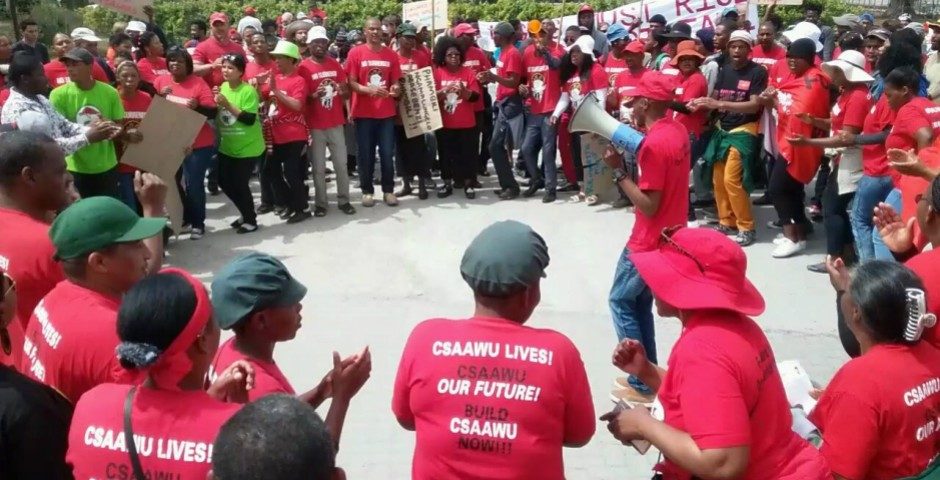
Criminalizing the strikers:
Robertson Winery abusing the court system in the fight against legal strike
For more than 10 weeks the workers at Robertson Winery (RW) have been striking against the apartheid wages that have kept the workers in a position of inferiority for too long, unable to properly support themselves and their families.
Kategori: Apartheid, Arbejdstagerrettigheder, Globale nyheder, Sydafrika
Wilma Africa has worked at RW for just about a year and a half. Although the strike is tough, she will keep striking until demands are met: “It’s difficult, because we don’t have money, we can’t provide for our children. But not to give him that satisfaction, we are going to do it – we are going to stand outside, although we don’t have food to eat, although we don’t have all the money in the world, but we are going to stand outside, just to prove to him that we can do it and that we will stand for our rights outside till he gives us our money. But for now, we are going on, CSAAWU is helping us, they are doing everything in their best to give us food and parcels, so we appreciate it very much.”
Company demanding prison time for union officials
The RW management has tried to divert the union’s attention from actual strike activities, by taking them to court on an unfounded allegation. RW claims that the union officials and the strike leaders have shown contempt for the court and breached the court interdict that was issued two days into the strike prohibiting violent behaviour and incitement to violence, and granting replacement labourers free and unhindered entry to the factory. It is these provisions that the strikers have allegedly breached. However, RW’s lawyers have not been able to provide sufficient evidence thus far. The case in the Labour Court has already been postponed three times for lack of information or issues with legal technicalities. At the last court hearing the judge indicated that he would give a verdict in the case on Friday the 11th November. The judge in question has not in previous cases ruled in CSAAWU’s favour, but with a bit of luck and fairness, he will have to rule against the company for lack of proof or dismiss the case altogether. If not, there is no telling what will happen, as the company is demanding prison sentences for union officials and strike leaders, as well as a fine of half a million rand (estimated 250.000 Danish kroner).
No matter the outcome of the case, the company will still have partly succeeded in their aim of diverting attention and resources. It takes energy and time to deal with the court case – time that should go towards strike activities and negotiations. Furthermore, court preparations and lawyers are extremely expensive, and the strikers have been struggling to pay the bills. The fact that the company is willing to go to court on the basis of such vague allegations shows that the ultimate goal is to disrupt the union’s work.
Workers demanding a peace clause if they are to return to work
For a long time, negotiations were at a standstill. RW negotiators are sticking with their offer of an extra 400 R per month – an offer that none of the workers are viewing as positive. According to Wilma: “We are going to stand outside till we get our money. Because we are not going to go inside for that 400 rand, because we know they are making billions and billions of rand […] So he must just give us our demands, that’s all. Nothing else, nothing less.” However, not all the strikers are as determined. As people are struggling financially and growing wearier by the day, many consider accepting the offer. At a meeting on Tuesday the 1st November the strikers discussed their next step. Concerns were voiced that going back to work would mean disciplinary hearings and dismissals for having been in the strike. Wilma says about their work place in general that “Sometimes you want to speak, but you can’t speak freely […]. You can’t talk, because you are afraid to talk, actually. What can happen is you get warnings, you can be expelled, it’s not nice, man, you see. All these human rights that they took away from us, it’s not good!” Therefore, it was agreed that a so-called peace clause had to be negotiated before entering back to work. If the company agrees to a peace clause, then the workers will accept the 400 R raise, although not a satisfactory outcome in the eyes of many. The peace clause means safety for the workers once they are back in the factory. Wilma elaborates, “We will appreciate it if he will do all that for us, so we can go back to work. But if he don’t do it, we are not going to go back. Because we are gonna stay outside. And I think many people will come and join us this time. Because we are now angrier than before. You see? Even more. So we shall appreciate if he do that for us, but if he don’t, we are going to be angry.”
Array